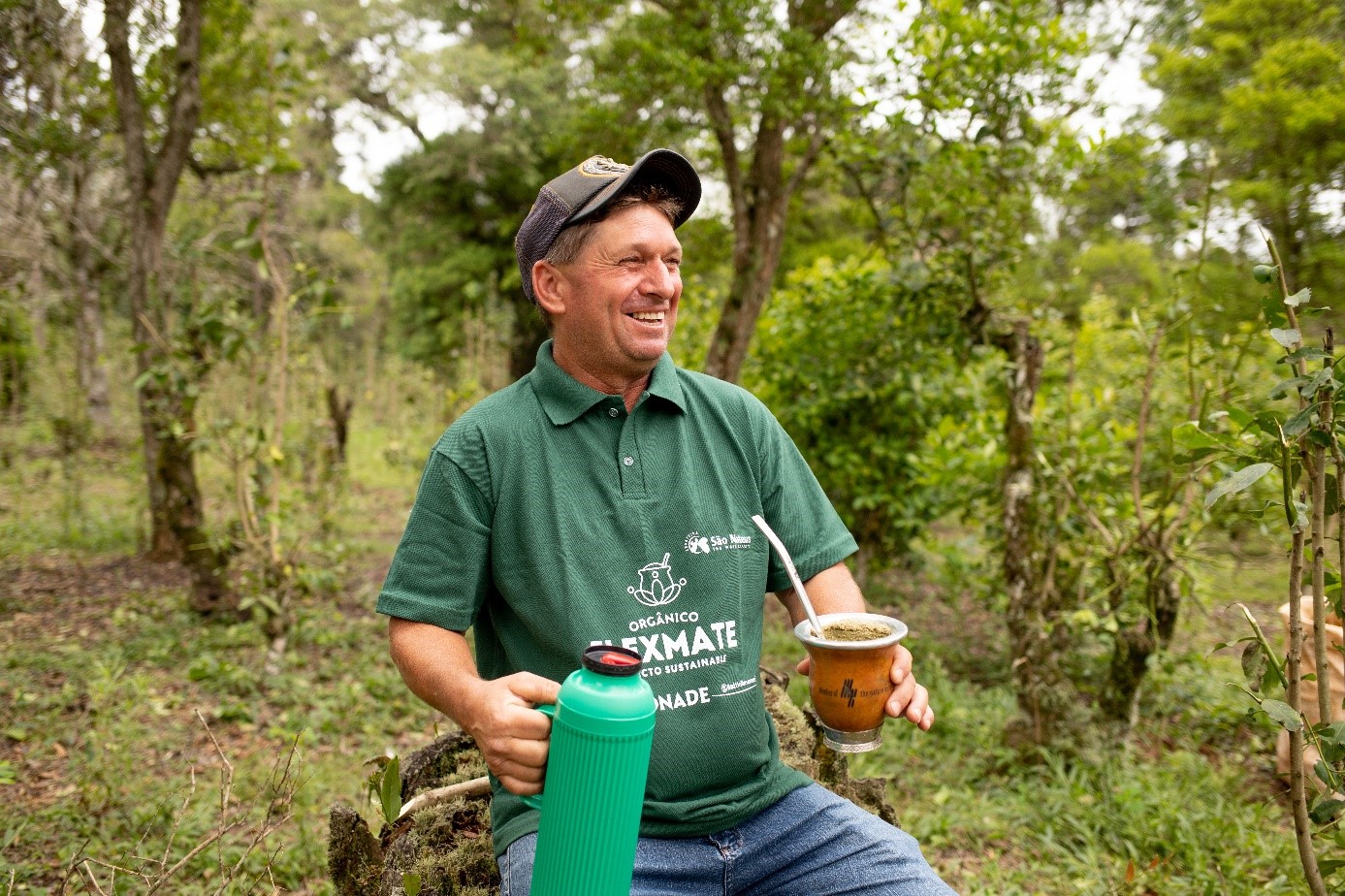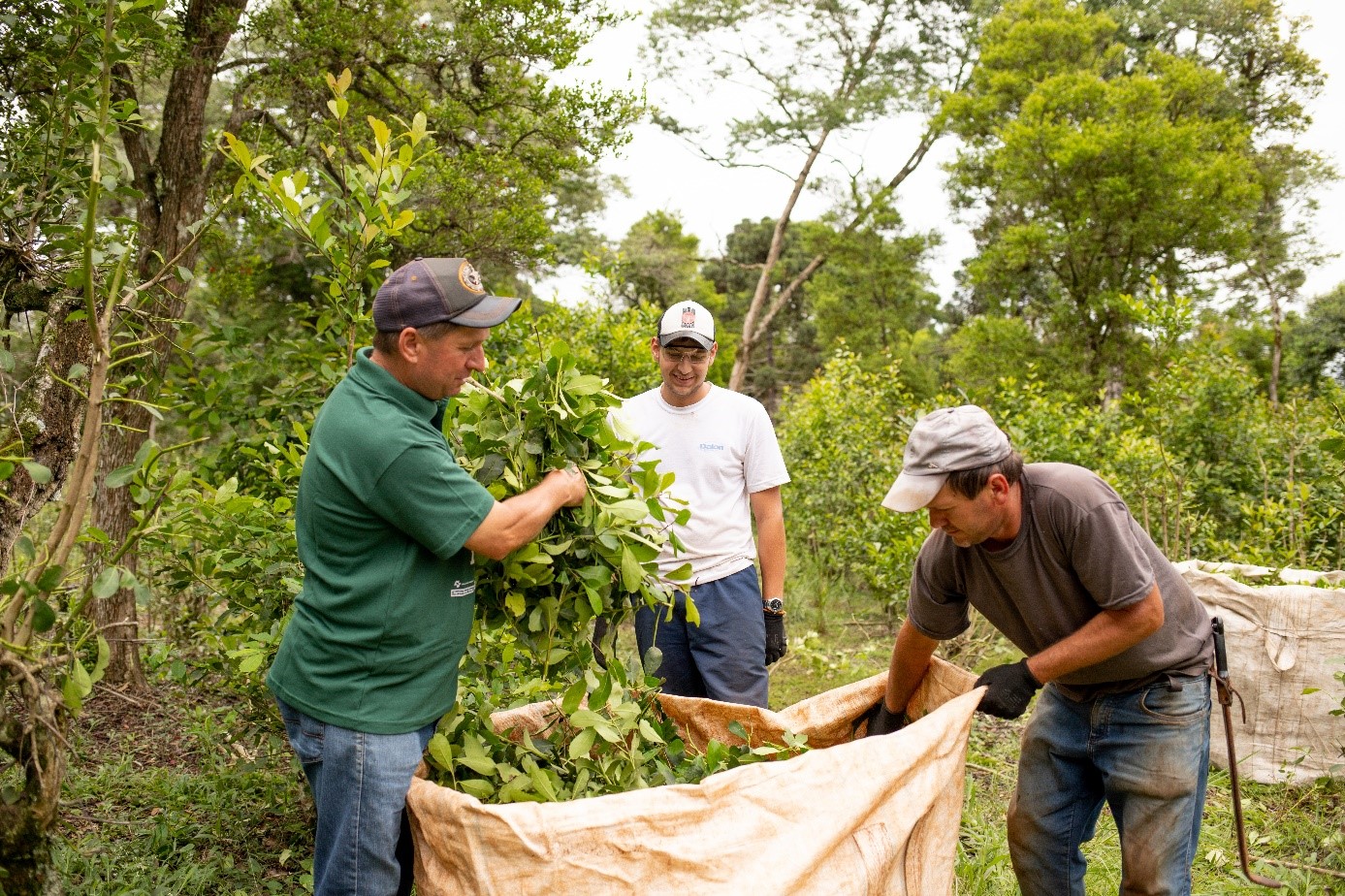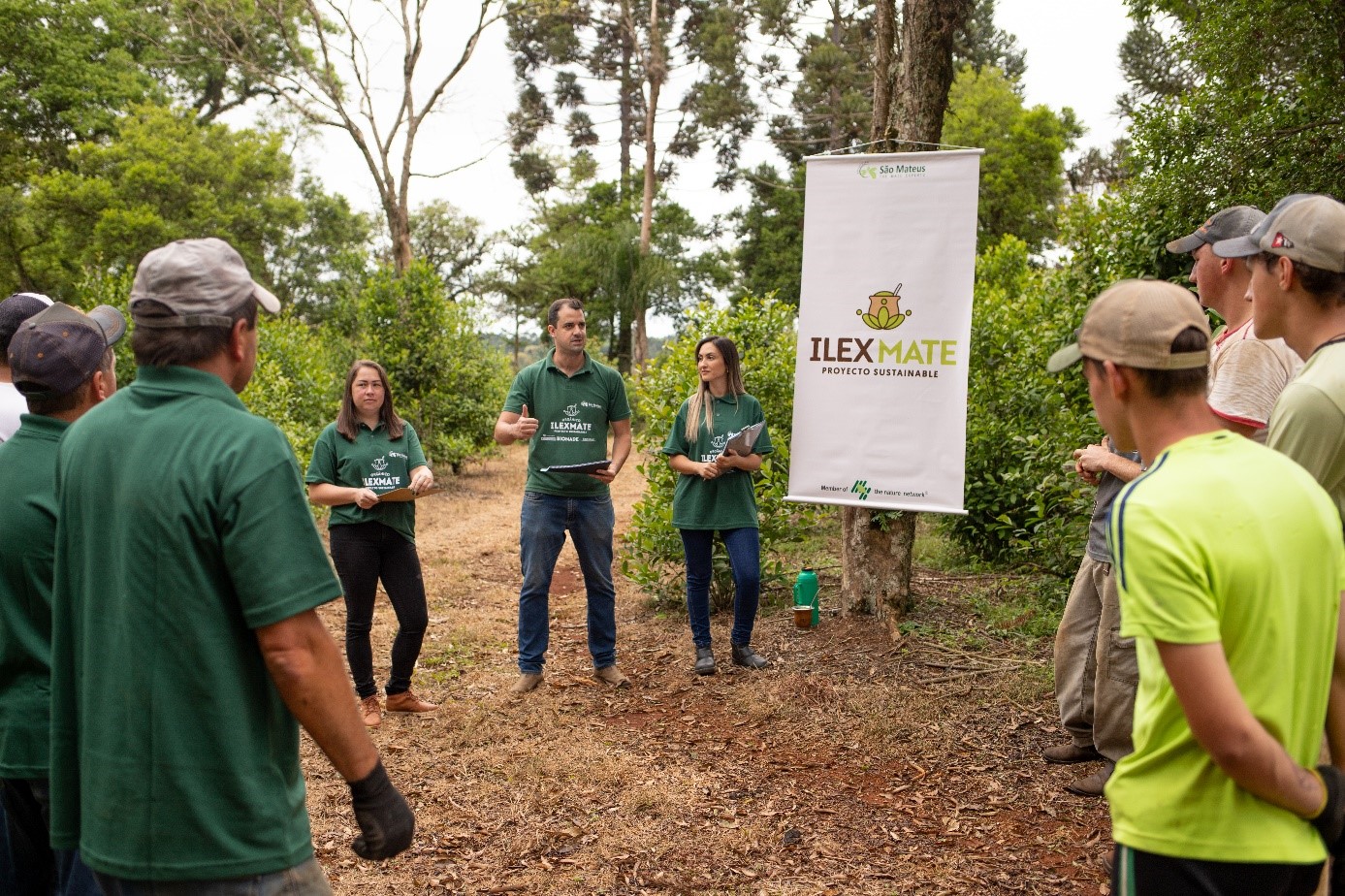Companies Bad Heilbrunner and Bionade are collaborating with the Martin Bauer Group and its joint venture partner Ervateira São Mateus to promote sustainable mate cultivation in the São Mateus do Sul project region in Paraná, southern Brazil. The project’s goals include protecting the ecosystem of the Atlantic Forest and promoting ecological cultivation methods while improving small farmers’ productivity and enabling them to adapt to climate change. The project team is also working with the younger generation to make sustainable mate cultivation fit for the future.
Mate: a healthy way to stay alert
Mate tea, made from the dried and extra fine-cut leaves of the evergreen yerba mate plant, is the most commonly drunk beverage in South America. Thanks to its high caffeine content, mate has a stimulating effect on mind and body. It is also appreciated for its rather earthy or smoky bittersweet taste. Recently, mate has been gaining increasing popularity outside of South America as a healthy way to stay alert. The yerba mate plant, which is closely related to the European holly, thrives in the jungles of Paraná.

A well-deserved break: Mate is a popular drink in South America and the farming families also enjoy its refreshing taste.
Mate from the Atlantic Forest
Most of the 70 farming families that have been participating in the project since May 2021 do not cultivate their mate on plantations – instead it grows in the primeval tropical Atlantic Forest on the Brazilian coast. Yerba mate flourishes in the shade of tall trees, where it is protected from wind and weather. That means the sustainable cultivation and responsible harvesting of mate do not only represent an important source of income for local families, these practices also protect the highly sensitive ecosystem in the place where they live. Around 4,000 mate growers live in Paraná, most of them small farmers. The region is responsible for most of Brazil’s mate production.
Biodiversity under threat
The Atlantic Forest is recognized as a UNESCO World Heritage Site as it is home to many different ecosystems and is very biodiverse – even more so than the better-known Amazon rainforest. More than 20,000 plant species and 2,000 animal species live here, and many of them are only found here (endemic species). Before Europeans arrived in South America, the Atlantic Forest had an area greater than one million square kilometers. Over 90 percent of that area has now been lost, particularly in recent decades, with much of it being used to grow soy and grain for animal feed. Today, the Atlantic Forest is one of the world’s most threatened forests. The Paraná region, where the mate for Bionade’s three mate soft drink flavors and for Bad Heilbrunner’s various mate teas is sourced, boasts contiguous rainforest and a remarkable biodiversity.
A beverage that respects the rainforest
Yerba mate plants have always been a natural part of the rainforest. Because of increased demand for mate tea, it is now also grown in monocultures, but around half of annual mate production still comes from mixed woodland – either wild-growing plants or plants that have been deliberately cultivated there. Mate plants that grow in the shade of tall trees have a more intense flavor and are much less bitter. This kind of mate cultivation encroaches only minimally on natural processes in the rainforest. The plants are harvested by hand and never completely cut down. Also, after harvesting, the plants are given 24 months to recover. This is a sustainable practice that is gentle on the rainforest’s ecosystem.

Farmers and participants in the Ilex Mate sustainability project carefully harvest the yerba mate leaves by hand.
The challenges facing mate farmers
Although demand for mate is rising, the small farms in São Mateus do Sul face numerous challenges. Climate change is evident here, with increased frequency of extreme weather events like flooding or long periods of drought. At family farms, productivity and yield are often low. That means family incomes are not rising in line with the regional average. People in the younger generation see little future for themselves in local agriculture and are increasingly moving to towns and cities. Numerous innovations are required and desired to meet these challenges.
The Ilex Mate sustainability project
The Ilex Mate project to promote sustainable mate cultivation and provide support for family farms in the mate supply chain will last three years and brings together four different partners: organic soft drink company Bionade, tea and natural remedy producer Bad Heilbrunner, B2B botanicals company Martin Bauer Group, and civil society organization Solidaridad.
“By participating in the Ilex Mate project, Bad Heilbrunner hopes to make a tangible contribution to sustainable development in our mate supply chain,” says Gunnar Heithecker, Head of Marketing at Bad Heilbrunner. “Alongside our actual products, it’s another way for us to express our commitment to quality, care and sustainability.”
Svenja Lonicer, Head of Marketing at Bionade explains that, “Bionade and its products stand for the protection and conservation of biodiversity. We are pleased to join the Ilex Mate project and thus have a direct, positive impact on our mate supply chains and a biodiversity hotspot.”
The Martin Bauer Group produces botanicals for the tea, beverage and food industries. It sources over 200 high-quality raw materials from more than 80 different countries, placing great value on responsible supply chain management and the sustainable development of its raw materials suppliers. The Martin Bauer Group initiated the Ilex Mate project and is responsible for its coordination.
Solidaridad is a civil society organization active around the globe. In Brazil it oversees sustainable rural development projects with the goal of continually improving agricultural practices and strengthening supply chains. It support the Martin Bauer Group in planning the project on site.

Members of Martin Bauer’s project partner train participants in sustainable cultivation practices.
Project goals, measures and impacts
The Ilex Mate project includes an extensive package of measures with three main focuses. One is sustainable cultivation practices and the principles of ecological farming. Family farms are encouraged to retain existing sustainable practices and learn new methods from agronomists in, for example, soil quality management and pest control. The experts set up demonstration farms and establish training sites where farmers can learn together and regularly discuss their experiences – making it easier for them to adopt the new practices.
The second focus is business management and productivity. The project team visits the participating families at their farms and works with them to analyze their current situation. Throughout the duration of the project, a Farm Management Plan will help the families to take active control of their business planning, including devising and implementing concrete measures, and overseeing the required budget. To improve yield, the mate farmers are provided with high-quality seedlings and receive training in the best way to prune their plants.
The third focus is the families’ teenagers and young adults. They are incorporated into intergenerational business planning and are encouraged to develop their own business concepts and moneymaking ideas with the support of agricultural advisors.


